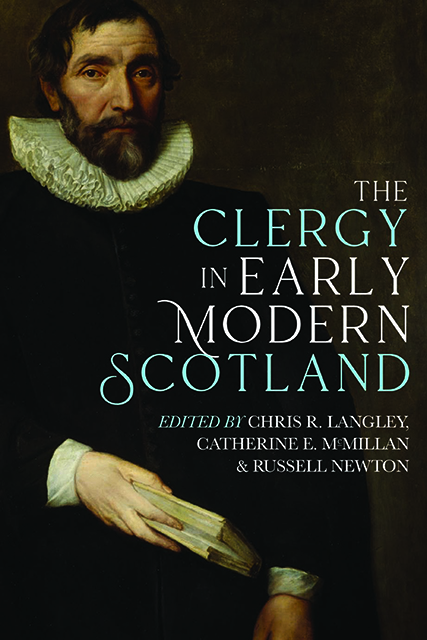Introduction
Published online by Cambridge University Press: 14 January 2023
Summary
The clergy have loitered on the periphery of studies of the Scottish Reformation for much of the twentieth and twenty-first centuries. At first glance, this assertion appears surprising because nineteenth- and early twentieth-century histories of the Reformation were replete with detail on the careers of early modern churchmen. Indeed, the history of the Reformation was, largely, a history of them. Figures like Patrick Hamilton and John Knox were ‘designed by the hand of Providence for achieving the lofty and adventurous enterprise’ of overthrowing the Catholic Church in Scotland. The narrative presented by nineteenth-century antiquarians was that John Knox and his clerical colleagues were ‘destined to do more for the cause of the reformation than all the nobles of Scotland, with their armed followers’. Knox’s ‘irrepressible energies’ dominated the pages of nineteenth-and early twentieth-century ecclesiastical histories. In these works, the Scottish Reformation was not simply overwhelmingly clerical in character: ministers were models for emulation.
Knox’s reputation as a Protestant hero began with David Buchanan’s The Life and Death of John Knox, which featured in the 1644 edition of Knox’s History of the Reformation and developed through a plethora of subsequent biographies. Similar works on Presbyterian leaders like Andrew Melville, Alexander Henderson, and Samuel Rutherford proliferated. These biographical accounts usually charted the subject’s involvement with Church policy and politics, but offered little insight into their personal lives or ministry within the parish. Many of the second-hand accounts of the clergy, particularly those of reforming and Covenanting ministers, bordered on the hagiographical, cataloguing and uncritically extolling the subject’s accomplishments and virtues, while rarely faulting their professional or private conduct. Thomas McCrie hailed Scotland’s early Protestant leaders as ‘men of piety and prayer’. He singled out Knox as a man of ‘firm and high-toned principle’ who was ‘endowed with talents of no common order’ for realising Protestant reform, to which he ‘consecrated himself, spirit, and soul, and body’. Comparatively few works were published on clergymen from different ecclesiological traditions. Notable episcopalians, such as Patrick Forbes of Corse, received some attention, while the Catholic clergy tended to be treated as a group.
While historians in the early to mid-twentieth century moved away from the denominational perspectives of their predecessors, the clergy continued to act as the fulcrum on which the religious changes of the sixteenth century hinged.
- Type
- Chapter
- Information
- The Clergy in Early Modern Scotland , pp. 1 - 12Publisher: Boydell & BrewerPrint publication year: 2021



